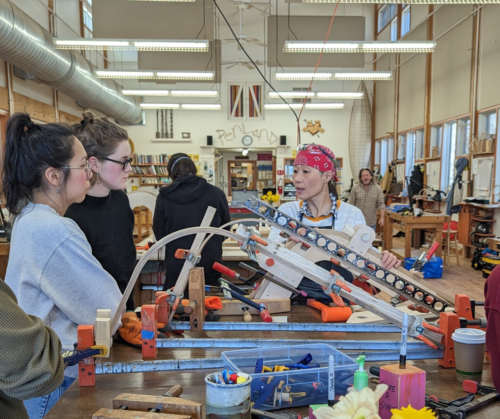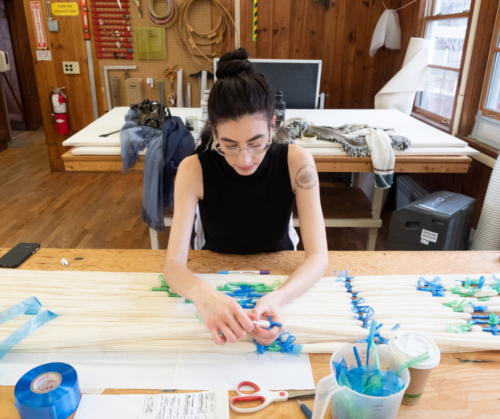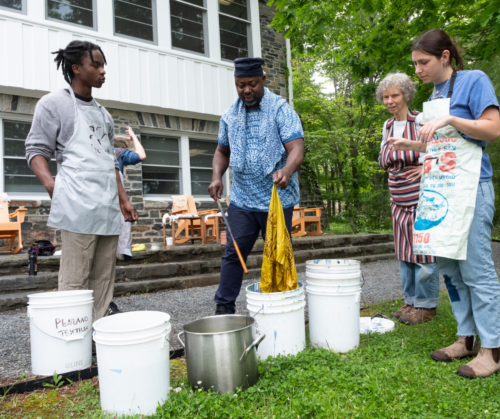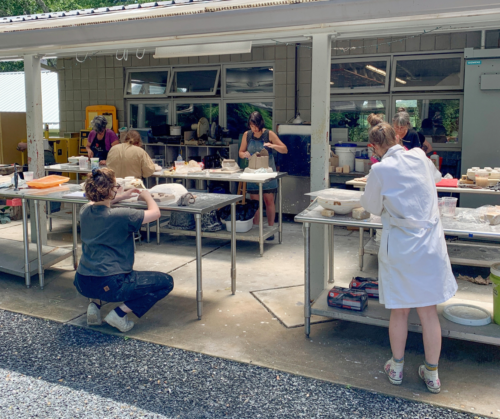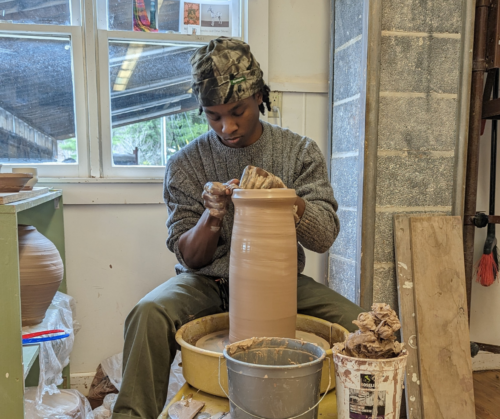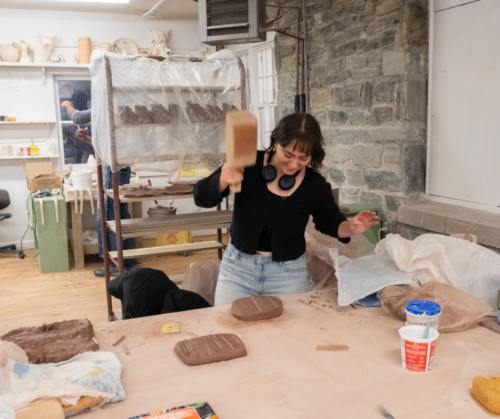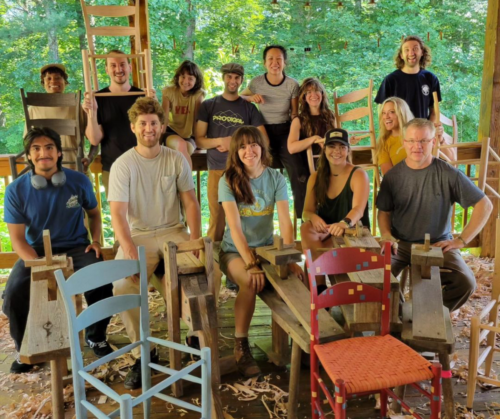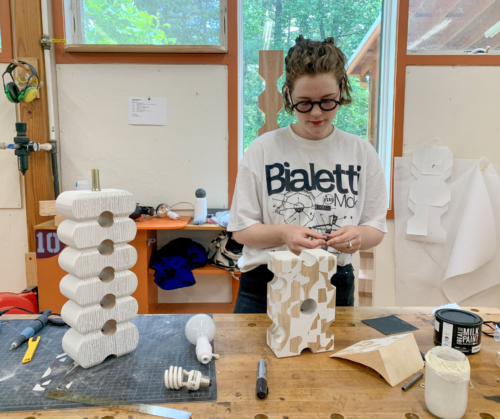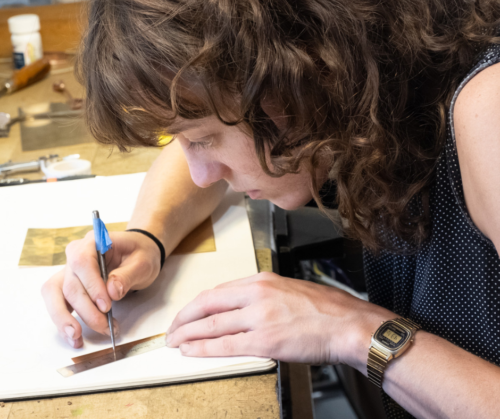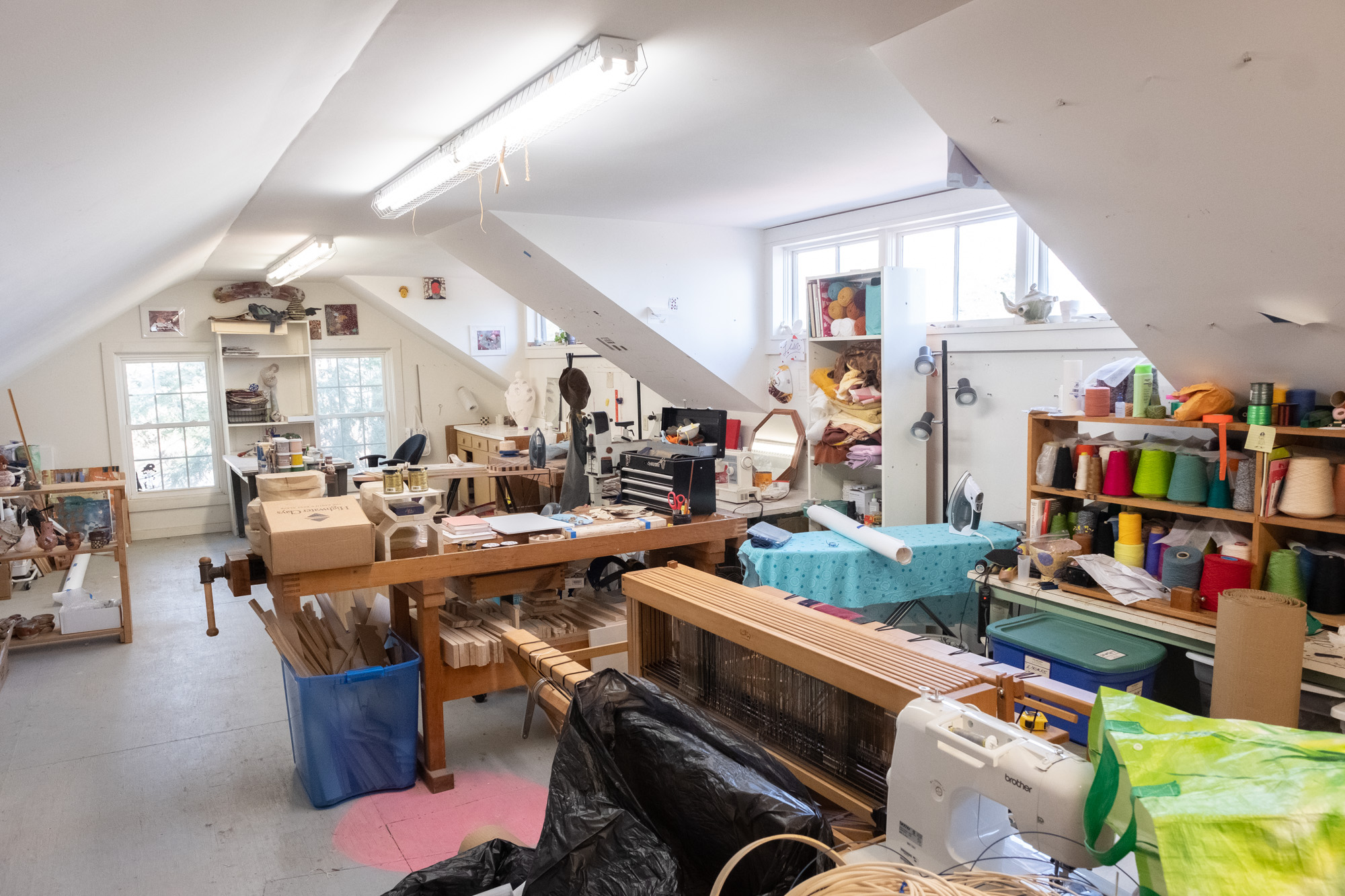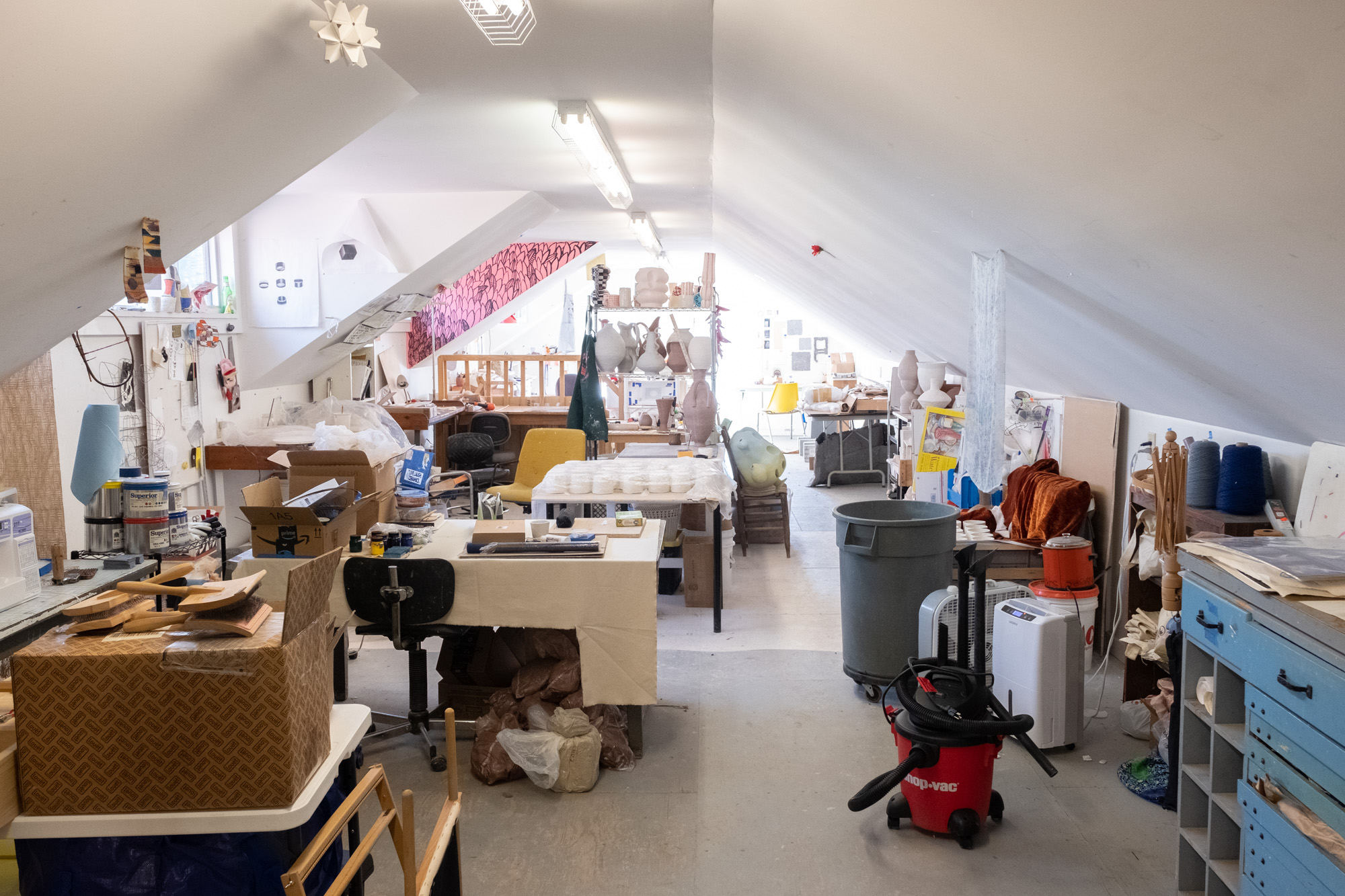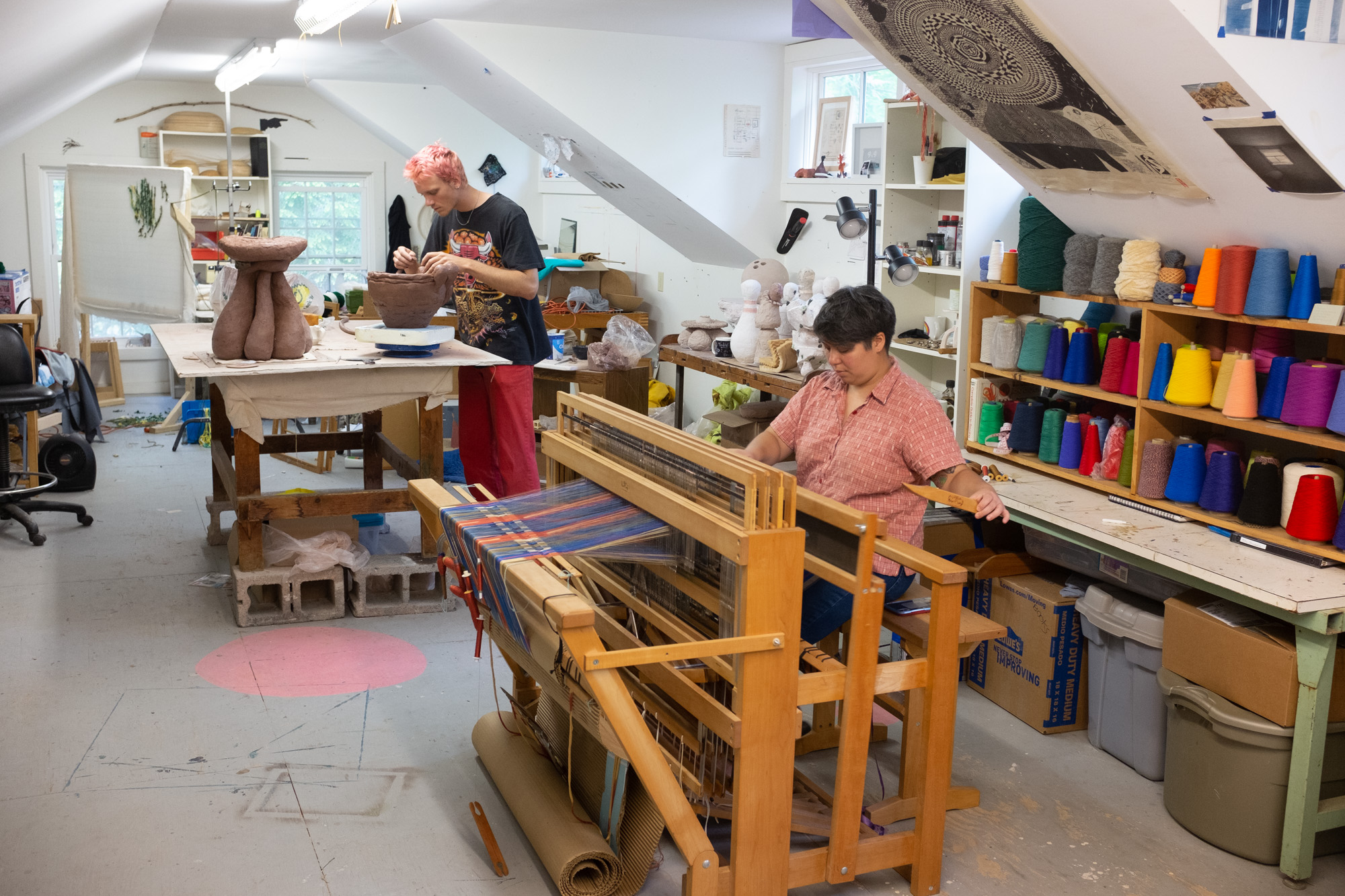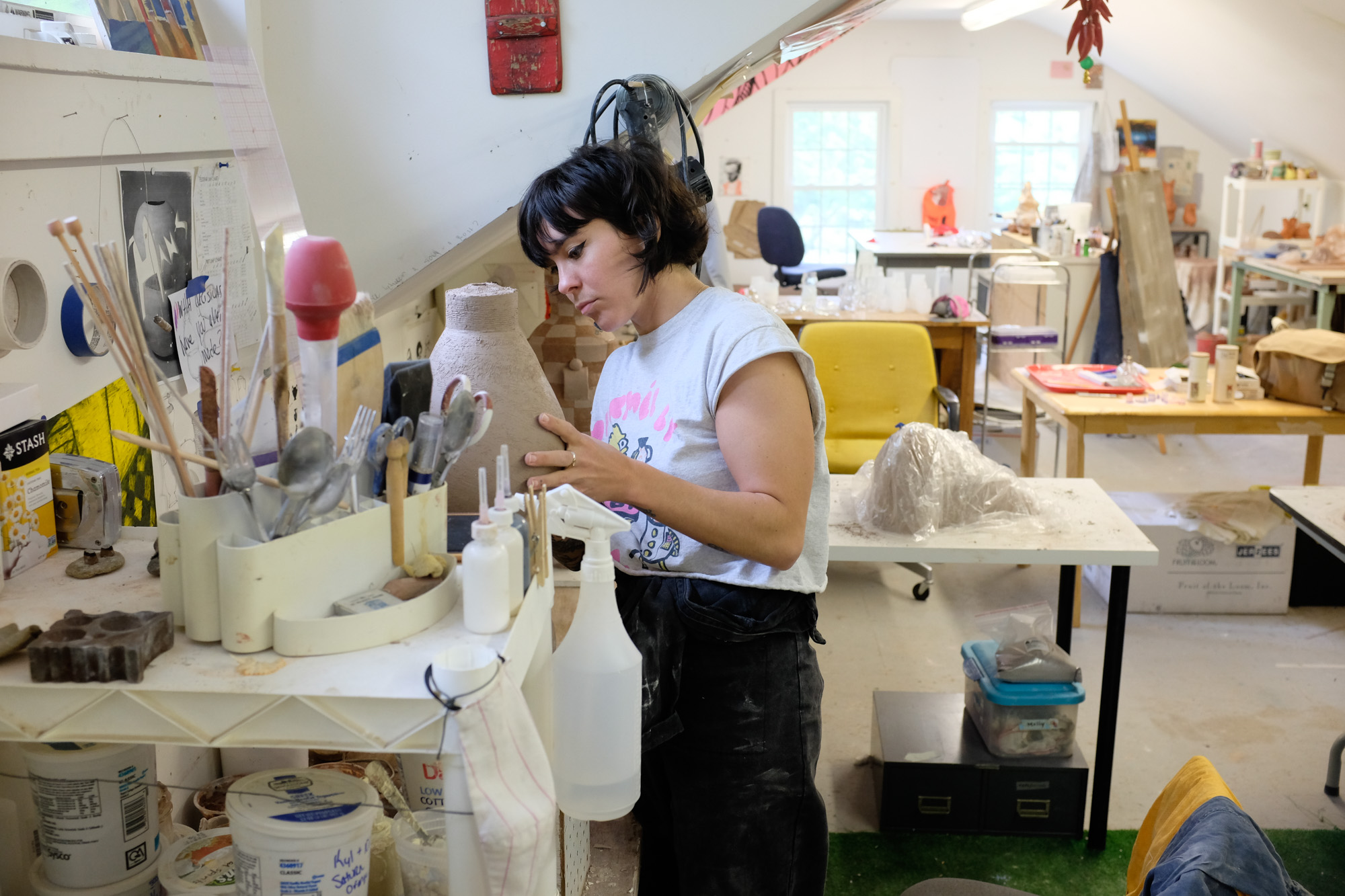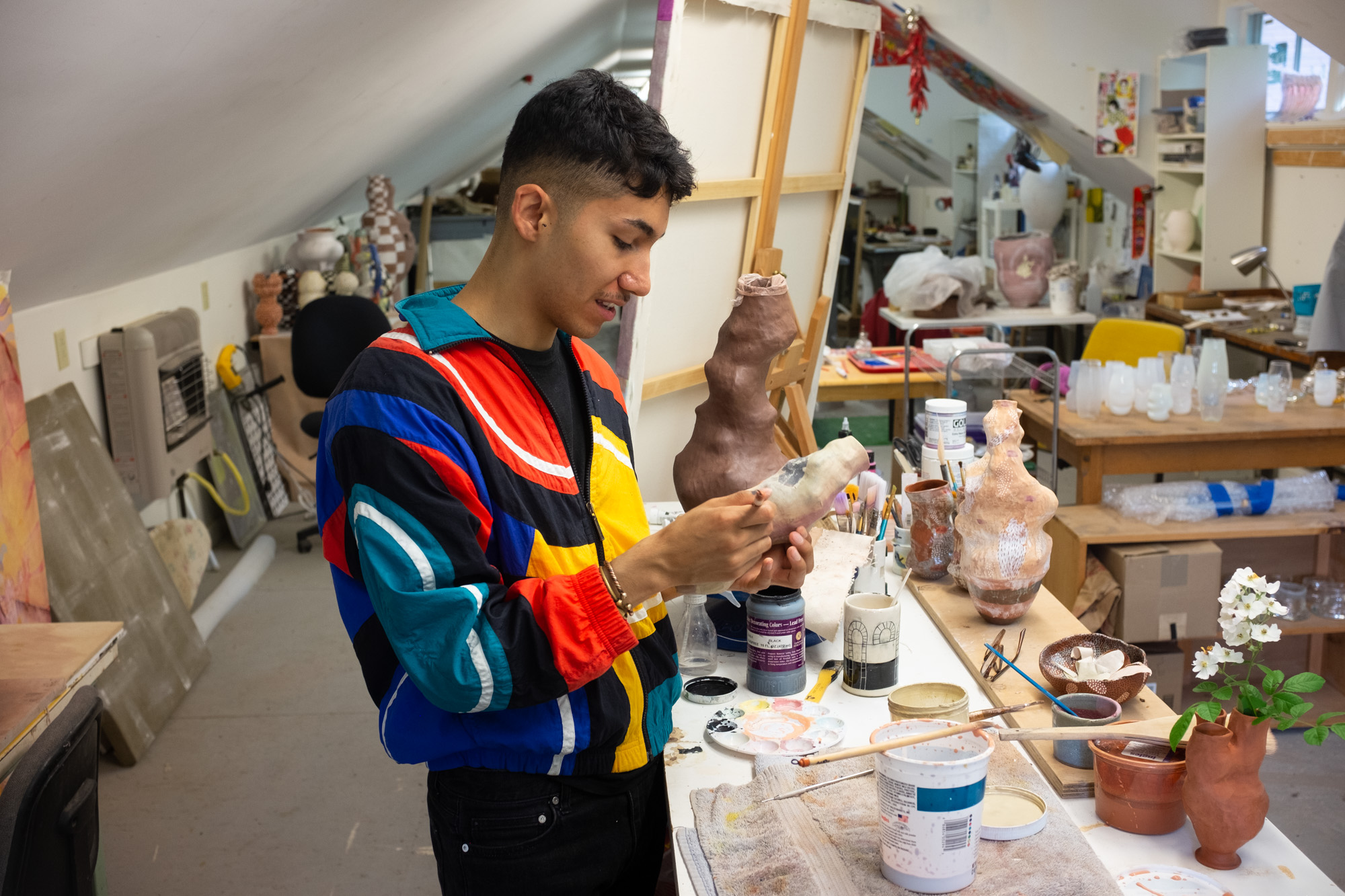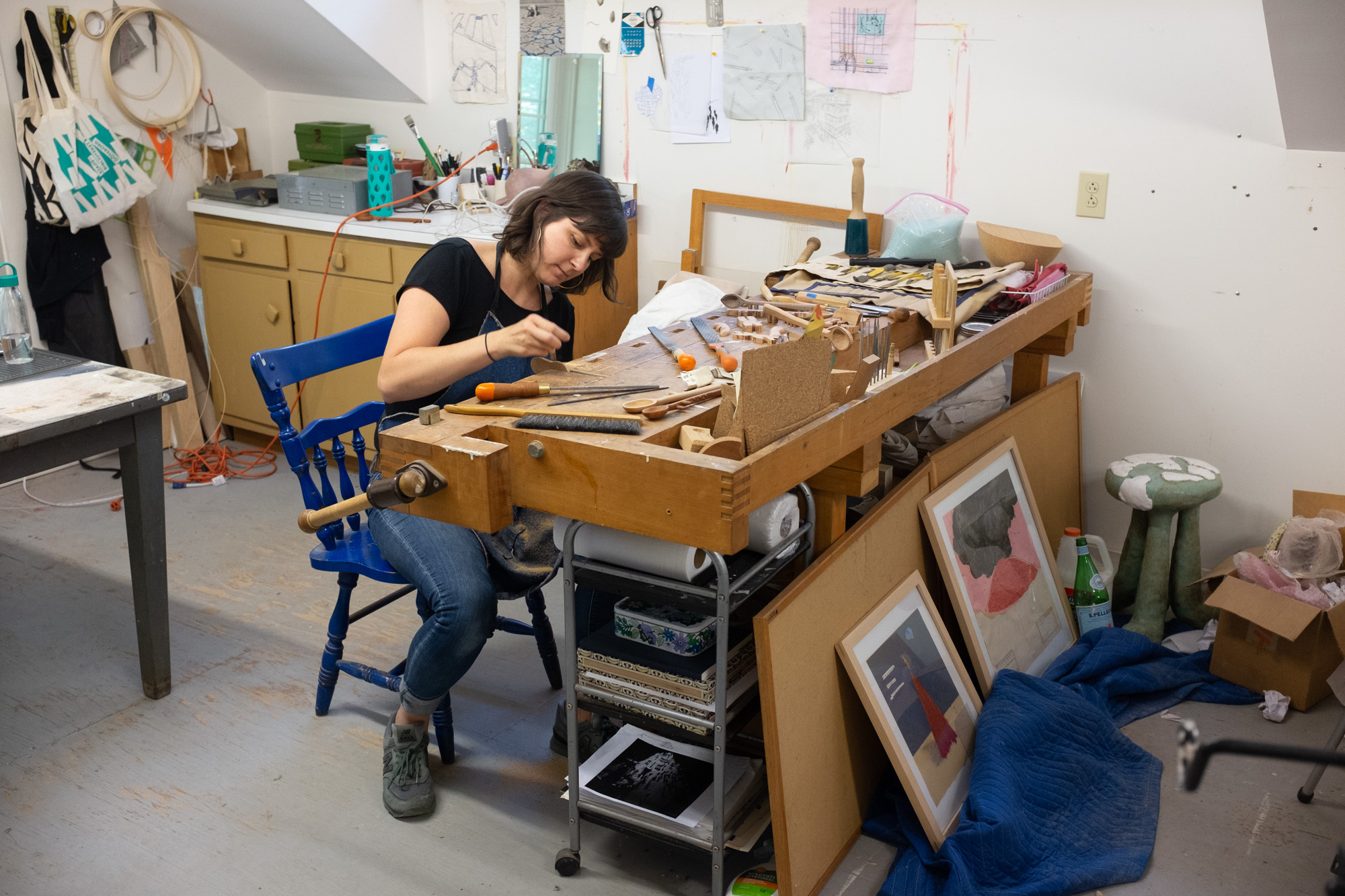Penland Core Fellowship Program
Two-year work-study fellowship
- Applications accepted July 15 – October 9, 2024
- Informational Zoom, September 9, 5-6pm ET.
To register, email programsassistant@penland.org with the subject “Core Informational Session.”
OVERVIEW
The Penland Core Fellowship Program is a two-year work-study fellowship for early career artists looking to expand technical skills and material fluency while working to support the day-to-day operations of a craft school. Artists of all backgrounds who want to advance their educational goals and explore their capacity to contribute to a thriving creative community are encouraged to apply. The goal of the program is to shape the future of contemporary craft by creating opportunity, connection, and immersive education for early career artists who bring a range of perspectives and goals to the school.
Penland core fellows fully engage with Penland by taking several workshops each year in familiar or new media, and performing integral jobs for the school. Penland’s ever-changing learning environment allows core fellows to study with world-class teaching artists from all over the US and abroad; this is a unique opportunity to create an educational path that responds to individual goals. The program can serve as preparation for careers in creative, non-profit, educational, and entrepreneurial sectors. A measure of the program’s success is the number of core fellows who have gone on to make a life in craft. To date over 200 people have participated in the program, and about 80% are practicing artists or professional contributors to the field of craft today.
The work that core fellows do for the school—jobs such as weekend cook, and entertainment coordinator—places them at the heart of Penland’s daily operations and gives them an opportunity to develop leadership skills and connect with artists from all over by working cooperatively towards a common goal. Core fellows are often a bridge between the staff and the studios and serve a unique role in helping others have a meaningful experience at Penland.
Core fellows live and work together and often learn as much from each other as they do from their instructors and mentors. In the process, they have a chance to form close friendships and often become part of each other’s lifelong creative and professional networks.
QUALIFICATIONS + REVIEW PROCESS
Applications are reviewed by a national panel of curators, educators, and other arts professionals as well as Penland staff. Panelists rotate each year to bring a range of new perspectives to the application process, and creating a diverse group of fellows is one of the stated goals of selection.
Specifically, applications will be reviewed with the following goals in mind:
- Program Goals
We believe the Core Fellowship Program can shape the future of contemporary craft by providing access to artists who can benefit from what this program has to offer—especially artists who have historically been underrepresented at the school and within the field of craft. - Collaboration and Group Dynamic
Core fellows share a house and are involved in collaborative tasks and decision-making along with the normal complexities of group living. They also work and take classes with a constantly changing community of instructors and students. We are looking for participants who can thrive as part of a group and community but also know when and how to step away and recharge as needed. Our goal is to bring together a diverse group of artists with a range of experience, perspectives, strengths, and goals. It is also important that the interests of each core group span a range of media taught at Penland. - Relevant Experience
Core fellows are asked to do many different kinds of work, ranging from basic physical labor to supervisory tasks. They must be adaptive to changing tasks and situations and committed to working cooperatively and confidently, sometimes with minimal direction or supervision. Penland staff will review each candidate’s application, CV, and reference to evaluate relevant experience (employment, internships, or volunteer work) and specific skills and accomplishments (what kind of work you have done, what contributions you have made, the consistency of your commitments, practical and/or supervisory experience). In addition to work experience, life experience and self-motivation are assets for this program. - Artwork
We are looking for work that shows a strong foundation and enough direction to tell us that the candidate will be able to take advantage of what this unique program offers. The review panel will score each portfolio in the following areas: proficient and/or intentional execution; clear/unique point of view; inquisitiveness and versatility; their interest in the work and its potential for growth. Candidates must be interested in working with materials and processes that are at the heart of our immersive workshops.
APPLICATIONS
INFORMATIONAL SESSION
September 9, 5-6pm Eastern Time via Zoom. We will have a few fellows and staff to help answer questions about the program and application process.
To register, email programsassistant@
OPENINGS
We expect to have 5 openings in the program in 2025; there will be 4 two-year fellowships which will begin in February 2025 and end in February 2027. There will also be 1 one-year fellowship which will begin in February 2025 and end in February 2026.
TO APPLY
Applications are accepted through SlideRoom from July 15, 2024 until the fall deadline, Oct 9, 2024. When the application is posted, you will find it here.
QUESTIONS?
If you have questions related to the Core Fellowship Program, you can direct them to:
Courtney Dodd, programs manager
828-765-2359 ext. 1313
programs@penland.org
RESPONSIBILITIES
Core fellows work an average of 20-25 hours/week in various service positions. In addition to fulfilling their work responsibility to the school, they are considered fully participating students and are expected to be engaged, productive members of each class they take. Work responsibilities begin each year in late February and end just before Thanksgiving. There is no regular work obligation from late November until late February, so most core fellows take advantage of this time to dive deeply into studio work.
COSTS TO CORE FELLOWS
Penland provides housing throughout the year, tuition for classes, and meals while the school is in session (approximately 8 months of the year). Core fellows receive a stipend of $500 every two weeks. They are responsible for all personal expenses, studio fees, and art materials.
LIVING SPACE
STUDIO SPACE
PENLAND CORE FELLOWSHIP PROGRAM FREQUENTLY ASKED QUESTIONS
APPLICATION + SCHEDULE
Do I have to have been to Penland or taken classes there in order to apply?
No prior connection to the school is required to apply. For finalists who have not been to Penland, we will set up a conversation to answer questions, provide insight, and make sure a candidate’s expectations are consistent with what Penland has to offer.
When is the application deadline?
The application deadline is Wednesday, Oct 9, 2024.
When will applicants be notified about final selection?
We do our best to notify all candidates during the first week of December following the deadline.
When does the program begin each year?
New fellows arrive in mid February to begin their first year. There are no exceptions to this start date. The fellowship season runs February to February, but regular work obligations for the school are only from late February to late November. During winter break, from December to February, fellows have the option to work in the studios at Penland but their regular work duties are paused.
How many spots are open each year?
We fill open positions each year depending on how many current fellows are leaving the program. We are planning to have 5 open spots this year; 4 two-year fellowships and 1 one-year fellowship.
How many applications do you receive each year?
In 2023 we received 200 complete applications.
What level of experience do I need in order to apply?
Competitive applicants should show a fluency in one or more craft media and a developed point of view and direction. This is an educational program designed to serve early career artists of all backgrounds and interests, so we are looking for potential and a desire to learn rather than technical mastery or a fully realized artistic voice. Fellows who have a genuine curiosity about craft materials and processes will benefit most from our immersive workshops.
Have most core fellows completed a BFA program prior to applying to the program?
Some have; others have not. We actively seek candidates with a range of craft/art experience and backgrounds. Some core fellows have graduated from art programs, some have chosen a non-academic route to learning. Many come from other disciplines and have developed a deep interest in expanding their skills and material knowledge. We are looking for people who seem to be at the right point in their educational path to most benefit from our program, regardless of background or trajectory.
Should my portfolio show a range of work, or should I focus on one body of work or medium?
Your portfolio should support your reasons for applying to the program. Some fellows focus in one area, others explore processes in several media. Either is great depending on your educational and creative goals.
What should my CV include?
Your CV should include formative experiences such as education or training; internships, volunteer work, or employment; specific skills and accomplishments. We rely heavily on the CV to give us an indication of your work background—what kind of work you have done, what kind of employee/volunteer you have been, how long you have stayed at past commitments, your practical skills, supervisory experience, etc. We also want to know what your art/craft background is and the timeline for this background, so please include dates. Please edit your CV to only one page, prioritizing the experiences that are most relevant to this application.
Do you accept international students?
The Core Fellowship Program includes a significant work component that requires U.S. citizenship, a green card, or resident alien status. We strongly suggest having this complete before applying.
Is there an age requirement?
Applicants must be 21 or older to be eligible for the Core Fellowship.
WORKSHOPS + STUDIO ACCESS
How many workshops do core fellows take?
Core fellows generally take seven workshops per year. Workshops range in duration from 4 days to 8 weeks with shorter, more focused classes in the summer and longer “concentrations” during the spring and fall. Daily class schedule and curriculum are determined by the visiting instructor, and core fellows do their best to dovetail job responsibilities with class participation.
What kind of studio access do core fellows have?
Core fellows share an open plan, unequipped studio space that is on the upper floor of the Ridgeway building which is a short walk from Penland’s main campus. It is for their use only and is open year round, 24 hours a day, 7 days a week. They can also propose to work independently in the school’s teaching studios when they are not being used for workshops and other programming. Seasonal breaks in programming usually occur between spring and summer, summer and fall, and during some winter months. There is no charge for studio access. Otherwise and most often, core fellows are enrolled in classes and work in the teaching studio for a particular workshop.
Are there opportunities for fellows to show work while at Penland?
Core fellows are encouraged to show and sell their work in the Core Gallery located in the Penland Coffee House. No commission is taken on these sales, and responsibility for rotating work and keeping the space looking its best falls to a core fellow as part of their work responsibilities. Core fellows are welcome to organize small pop-up exhibitions/sales in Gallery North (a small exhibition space on campus) throughout the year, and core fellows have an annual group exhibition (Core Show) of their work each year. Core fellows have the opportunity to show finished work in the Penland Gallery after meeting with the gallery director to determine if the work is a good match for the gallery’s curatorial voice.
HOUSING + MEALS
What is housing like?
Core fellows share a large, recently built house on Penland’s campus. Each core fellow has a private bedroom with a shared all gender bathroom (2 people per bathroom). There is a large, open plan communal kitchen, dining and living area with a shared laundry room, storage room, and outdoor spaces. The house is fully furnished with a dedicated accessible parking space and ADA compliant bathroom. We cannot offer accommodations for partners or families and do not recommend living off campus. We also have a no pets policy.
Do I have to pay rent for my housing? Do I have to pay utilities?
There are no rental or utility fees for housing. We provide shared living as part of the work/study arrangement.
Are meals provided?
Core fellows are welcome to eat three meals a day in the school dining hall when classes are in session (March – April, June – August, mid-September – mid-November).
FINANCIAL + WORK RESPONSIBILITIES
What benefits are provided for core fellows?
Core fellows receive a stipend of $500 every two weeks, or $13,000 annually. There is no charge for housing or utilities; meals are provided while the school’s dining hall is open (approximately 8 months of the year). There is no tuition cost for workshops, and core fellows can take up to 7 workshops per year.
What are the costs to core fellows?
Core fellows are responsible for paying discounted studio fees associated with each workshop. It is difficult to estimate the annual cost of studio fees, but most fellows report annual studio fees in the $2000-$3000 range. When considering the financial feasibility of the fellowship, candidates should factor in monthly expenses such as car insurance, cell phone plans, student loans, etc.
Does Penland provide health insurance?
Penland will work one-on-one with all core fellows to help each apply for personal insurance plans on the Affordable Care Act marketplace. While it varies depending on each person’s financial situation, most core fellows who do not have significant income outside of the program receive full or close-to-full subsidies for ACA plans.
What is a typical schedule for a Core Fellow?
The Core Fellowship runs from February to February and schedules vary throughout the year. Regular work responsibilities begin each year in late February and end just before Thanksgiving. From late November until late February there are minimal formal commitments, so most core fellows take advantage of this time to dive deeply into studio work or spend time away from campus.
During workshops, fellows help prepare, maintain, and facilitate daily tasks on campus by leading a team of work study students. Each fellow has a different work schedule that is planned to accommodate class demonstrations. Protected demo times happen twice a day at 10:00-11:30 AM and 2:00-4:30 PM and allow fellows to participate without work distraction. Fellows are responsible for balancing their studio, work, and personal responsibilities with consistent support from their supervisor/s.
What are core jobs like?
All core jobs require about 25 hours/week and involve one of the following: working in the kitchen for meal prep; facilitating/planning school functions such as slide talks, parties, instructor gatherings, etc; managing teams of work/study students in the dining room for set-up and clean-up of meals. All core jobs involve working before and after each session to get the school ready for the next session; all core jobs involve work hours throughout the week or weekend during each session. Jobs responsibilities may be adjusted at any time, at Penland’s discretion. It is not feasible for a fellow to have an additional work obligation outside of their commitment to the school, but some take advantage of seasonal breaks to pursue project related or short-term work opportunities.
Can job accommodations be made for individual core fellows?
Jobs performed by core fellows are vital to the operations of the school. Penland will happily make reasonable accommodations to help fellows perform the jobs. We are not, however, able to change the essential nature of the jobs, which tend to be physically demanding.
COMMUNITY + LOCAL AREA
What is it like to live at Penland?
Penland can be described as a campus, a village, and a community of artists that extends into the area surrounding the school. Our campus includes over 400 acres of woods, meadows, and exquisite views. Core fellows live on the edge of a large meadow, a 10-minute walk from central campus. Most daily needs are walkable or bikeable on roads and trails—the studios, dining hall, coffee house, supply store, gallery. The area surrounding the school is home to over 100 professional craft artists, many of whom are affiliated with Penland. The nearby towns of Spruce Pine, Baskerville, and Burnsville are a short drive away (10-20 minutes by car) and offer amenities one might expect from any small-town—grocery stores, gas stations, schools, a hospital, coffee shops, and a handful of restaurants.
Each year approximately 1,400 people come to Penland for instruction and another 14,000 pass through as visitors. Penland has no standing faculty; its instructors come to Penland from all over the US and abroad. Core fellows and resident artists live on campus and work at the school year-round. Our staff of over 60 employees work at the school year-round and live in the surrounding community. Workshop instructors and students stay at Penland only while teaching or taking one of our immersive workshops.
What is the surrounding area like?
Penland is located in Mitchell County, NC, which offers the expansive beauty of the Blue Ridge Mountains and the advantages and challenges of rural, small-town living. The Blue Ridge Parkway, Mount Mitchell, Roan Mountain, and Linville Falls are all nearby. The nearest towns are Spruce Pine (10-minute drive, population of 2,000), Bakersville (10-minute drive, population, of 500), and Burnsville (20-minute drive, population of 2,000). Penland is located within a one-hour drive of Asheville, Boone, and Johnson City, TN. Charlotte is 120 miles to the southeast; Atlanta is 250 miles to the southwest.
Mitchell County is a rural, low-income community whose economy evolved around the industries of mining, agriculture, and manufacturing. Like much of Appalachia, our region leans politically conservative and does not have the cultural and racial diversity of urban areas. The Toe River Valley, where Penland is located, is home to hundreds of working craftspeople, galleries, studios, and creative businesses.



